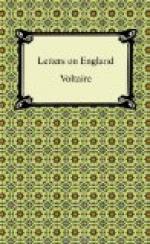The Earl of Rochester’s name is universally known. Mr. de St. Evremont has made very frequent mention of him, but then he has represented this famous nobleman in no other light than as the man of pleasure, as one who was the idol of the fair; but, with regard to myself, I would willingly describe in him the man of genius, the great poet. Among other pieces which display the shining imagination, his lordship only could boast he wrote some satires on the same subjects as those our celebrated Boileau made choice of. I do not know any better method of improving the taste than to compare the productions of such great geniuses as have exercised their talent on the same subject. Boileau declaims as follows against human reason in his “Satire on Man:”
“Cependant a le voir plein
de vapeurs legeres,
Soi-meme se bercer de ses propres
chimeres,
Lui seul de la nature est la baze
et l’appui,
Et le dixieme ciel ne tourne que
pour lui.
De tous les animaux il est ici le
maitre;
Qui pourroit le nier, poursuis tu?
Moi peut-etre.
Ce maitre pretendu qui leur donne
des loix,
Ce roi des animaux, combien a-t’il
de rois?”
“Yet, pleased with idle whimsies of his brain, And puffed with pride, this haughty thing would fain Be think himself the only stay and prop That holds the mighty frame of Nature up. The skies and stars his properties must seem, * * * Of all the creatures he’s the lord, he cries. * * * And who is there, say you, that dares deny So owned a truth? That may be, sir, do I. * * * This boasted monarch of the world who awes The creatures here, and with his nod gives laws This self-named king, who thus pretends to be The lord of all, how many lords has he?”
OLDHAM, a little altered.
The Lord Rochester expresses himself, in his “Satire against Man,” in pretty near the following manner. But I must first desire you always to remember that the versions I give you from the English poets are written with freedom and latitude, and that the restraint of our versification, and the delicacies of the French tongue, will not allow a translator to convey into it the licentious impetuosity and fire of the English numbers:—
“Cet esprit que je hais, cet
esprit plein d’erreur,
Ce n’est pas ma raison, c’est
la tienne, docteur.
C’est la raison frivole, inquiete,
orgueilleuse
Des sages animaux, rivale dedaigneuse,
Qui croit entr’eux et l’Ange,
occuper le milieu,
Et pense etre ici bas l’image
de son Dieu.
Vil atome imparfait, qui croit,
doute, dispute
Rampe, s’eleve, tombe, et
nie encore sa chute,
Qui nous dit je suis libre, en nous
montrant ses fers,
Et dont l’oeil trouble et
faux, croit percer l’univers.
Allez, reverends fous, bienheureux
fanatiques,
Compilez bien l’amas de vos
riens scholastiques,
Peres de visions, et d’enigmes
sacres,




